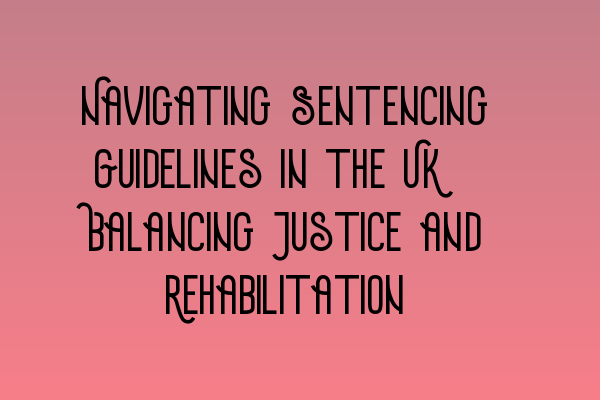Navigating Sentencing Guidelines in the UK: Balancing Justice and Rehabilitation
Welcome to SQE Criminal Law & Practice Law UK, the premier source of legal information and guidance. In this blog post, we will explore the complex world of sentencing guidelines in the UK and the delicate balance between justice and rehabilitation. Understanding these guidelines is essential for both legal professionals and individuals involved in criminal cases.
Why Sentencing Guidelines Matter
Sentences handed down by the courts play a vital role in maintaining the rule of law and ensuring public safety. Sentencing guidelines serve as a framework for judges to determine the appropriate punishment for a wide range of offenses. These guidelines take into account factors such as the severity of the crime, the offender’s criminal history, and any mitigating or aggravating circumstances.
Keywords: Sentencing Guidelines, Justice, Rehabilitation, UK, Criminal Cases
The Balancing Act: Justice vs. Rehabilitation
One of the ongoing debates in the criminal justice system is the delicate balance between justice and rehabilitation. The primary purpose of a sentence is to punish the offender for their wrongdoing. However, it is equally important to consider the potential for rehabilitation and the chance for the offender to reintegrate into society as a law-abiding citizen.
SQE 1 Practice Exam Questions and SQE 1 Practice Mocks FLK1 FLK2 provide aspiring legal professionals with the necessary tools to test their knowledge and understanding of the law.
The Role of Sentencing Guidelines
Sentencing guidelines help strike a balance between justice and rehabilitation by providing a structured approach to sentencing. These guidelines offer consistent and transparent sentencing standards, ensuring that similar offenses are treated similarly across the country. By considering the unique circumstances of each case, judges can weigh the severity of the offense against the potential for rehabilitation, leading to fair and proportionate sentences.
Keywords: Sentencing Guidelines, Justice, Rehabilitation, Sentencing Standards, Fair and Proportionate Sentences
Understanding Sentencing Guidelines
It is essential for legal professionals and individuals involved in criminal cases to have a comprehensive understanding of the sentencing guidelines. Familiarity with the guidelines enables defense lawyers to advocate effectively for their clients and helps prosecutors seek appropriate penalties for the crimes committed. Additionally, individuals who are facing criminal charges can better understand the potential consequences and make informed decisions about their defense.
If you are aspiring to pursue a career in criminal law, our SQE 2 Preparation Courses offer comprehensive training that covers all aspects of criminal law and practice.
Keywords: Sentencing Guidelines, Legal Professionals, Criminal Cases, Defense Lawyers, Prosecutors, Informed Decisions
Adapting to Evolving Sentencing Guidelines
Sentencing guidelines are not set in stone; they evolve and adapt to reflect changes in society and legal precedents. Legal professionals must stay up-to-date with these changes to provide the most accurate advice and representation to their clients. Additionally, ongoing education and training are essential for maintaining a deep understanding of the intricacies of the sentencing guidelines.
Aspiring legal professionals should also be aware of the SQE 1 Preparation Courses available to them, which provide a solid foundation in legal knowledge and skills required to pass the SQE exams.
Keywords: Sentencing Guidelines, Legal Professionals, Changes in Society, Legal Precedents, Ongoing Education, SQE Exams
Conclusion
Navigating sentencing guidelines in the UK is a complex task that requires a deep understanding of the law and the delicate balance between justice and rehabilitation. By adhering to these guidelines, legal professionals can ensure fair and proportionate sentences while keeping in mind the potential for rehabilitation. Ongoing education and training are essential for staying up-to-date with evolving guidelines and providing effective advice and representation to clients.
For more information about the SRA SQE exam dates and requirements, visit our article on SRA SQE Exam Dates.
